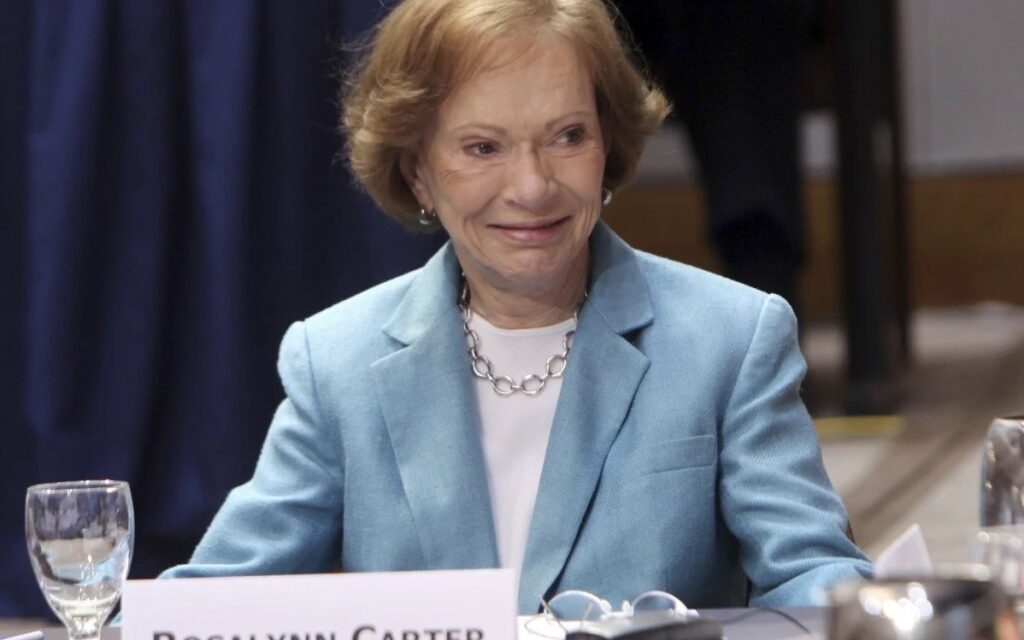By Catherine Pugh,
Special to the AFRO
And
Tashi McQueen,
AFRO Political Writer,
Tmcqueen@afro.com
Former First Lady Rosalynn Carter, wife of former President Jimmy Carter, died on Nov. 19 in Plains, Ga. She was 96 years old.
Carter adamantly advocated for mental health and women’s rights throughout her lifetime. She was married to President Carter for 77 years, during which they were viewed as a powerful duo.
While serving as first lady, she was a trusted advisor to the president and the Carter administration’s emissary in Latin America – helping to improve U.S.-Latin American relations.
According to the Carter Center, the couple’s non-profit organization promoting peace, she leaves behind four children, 11 grandchildren and 14 great-grandchildren.
Ceremonies for Carter will be held Nov. 27 through Nov. 29 in Atlanta and Sumter County, Ga.
This week, the AFRO spoke with leaders in the Black community about the life and legacy of Rosalynn Carter.
Attorney A. Dwight Pettit was one of the first Baltimoreans to meet Jimmy Carter during his 1976 campaign for president.
“I met Candidate for President Jimmy Carter at a Hopkins reception and gave him a campaign contribution in his hand,” recalls Pettit. “ told him- ‘I believe you’re going to be the next president of the United States.’”
That began their long-standing relationship and the trusted relationship with the members of the Carter family— including the matriarch.
Pettit was quick to call his wife, Barbara, and she gathered her friends to go meet the future U.S. president. Attorney Pettit became very close to the Carters. He was appointed as general counsel to the Democratic Party and reported daily to President Carter after his inauguration. As a result, he crossed paths with First Lady Carter often.

“I had the opportunity to spend a great deal of time with Rosalynn Carter,” said Pettit. “The president called me and told me during the campaign he was sending his wife, Rosalynn, to Baltimore to meet the people. At that time, they did not have Secret Service, so it was Barbara and I, a driver and one Carter campaign worker.”
He remembers them going to five churches that day.
“We concluded the day at a reception at Roland Patterson’s House, hosted by his wife,” recalls Pettit.
The Carter’s, Pettit said— especially Rosalynn—loved his wife, Barbara, and invited them both to their home in Plains, Ga.
“We took Ms. Oliver, then editor at the AFRO-American Newspapers, with us and she interviewed the Carters. Rosalynn and Barbara shared coffee and stories in the kitchen, while their daughter Amy played.”
Upon hearing of her death, legislators from around the country made comments on former First Lady Carter’s passing.
“First Lady Rosalynn Carter’s death is a devastating loss to the Carter Family, to the mental health community, to women in politics and to all Americans. Rosalynn Carter contributed to her husband’s incredible work both during his administration and after they left the White House, building homes, advocating for human rights, fighting diseases and serving the underprivileged,” said U.S. Rep. Alma Adams (D-N.C.-12), in a statement. “She was the heart and soul of their shared humanitarian work that touched so many lives. She inspired a generation of women to believe they could make their mark in government, driving an ongoing compassionate shift in our politics.”
Adams continued, stating that former First Lady Carter’s “impact in the mental health community, in the developing world, in diplomatic circles and in the hearts and minds of every American, will live on for generations to come. Her legacy will not be forgotten. On behalf of the people of the 12th Congressional District of North Carolina, I extend my deepest condolences and sympathies to former President Jimmy Carter, and the entire Carter family. You are in our thoughts and prayers as you prepare to honor the life of your beloved wife and mother. A nation weeps with you.”
U.S. Rep. Nikema Williams (D-Ga.-05) also issued a statement on the death.
“Rosalynn Carter worked tirelessly for women’s rights and is a shining example of the power women possess when given an opportunity,” said Williams. “She used her opportunity to serve others as an advocate for mental health, peace, housing and marginalized communities around the globe. Rosalynn Carter made the world a better place and yet what she would likely say was her most noteworthy accomplishment was 77 years of loving, joyful marriage to President Jimmy Carter.”
Across the country Black leaders are remembering the work First Lady Rosalynn Carter did on the front lines of civil and human rights— but also in her circle of family and friends.
“Rosalynn Carter was a great lady, and one of the most down to earth persons you would ever meet,” said Pettit. “History will judge them both as among the greatest humanitarians in the world – she was always right beside him.”
Former First Lady Michelle Obama also spoke on the life and legacy her predecessor leaves behind.
“Guided by her abiding faith and her commitment to service, Mrs. Carter used her platform in profoundly meaningful ways. Her groundbreaking work to combat the stigma faced by those struggling with their mental health brought light to so many suffering in silence,” said Obama, in a statement. “She advocated for better care for the elderly. She advanced women’s rights. And she remained a champion for those causes — and many others like building affordable housing for those in need and caring for our nation’s caregivers — in the more than four decades that followed.”
“When our family was in the White House, every so often, Rosalynn would join me for lunch, offering a few words of advice and always — always — a helping hand,” Obama fondly recalled. “She reminded me to make the role of First Lady my own, just like she did. I’ll always remain grateful for her support and her generosity.
Tashi McQueen is a Report For America Corps Member.
The post Black leaders reflect on life and legacy of former First Lady Rosalynn Carter appeared first on AFRO American Newspapers .










